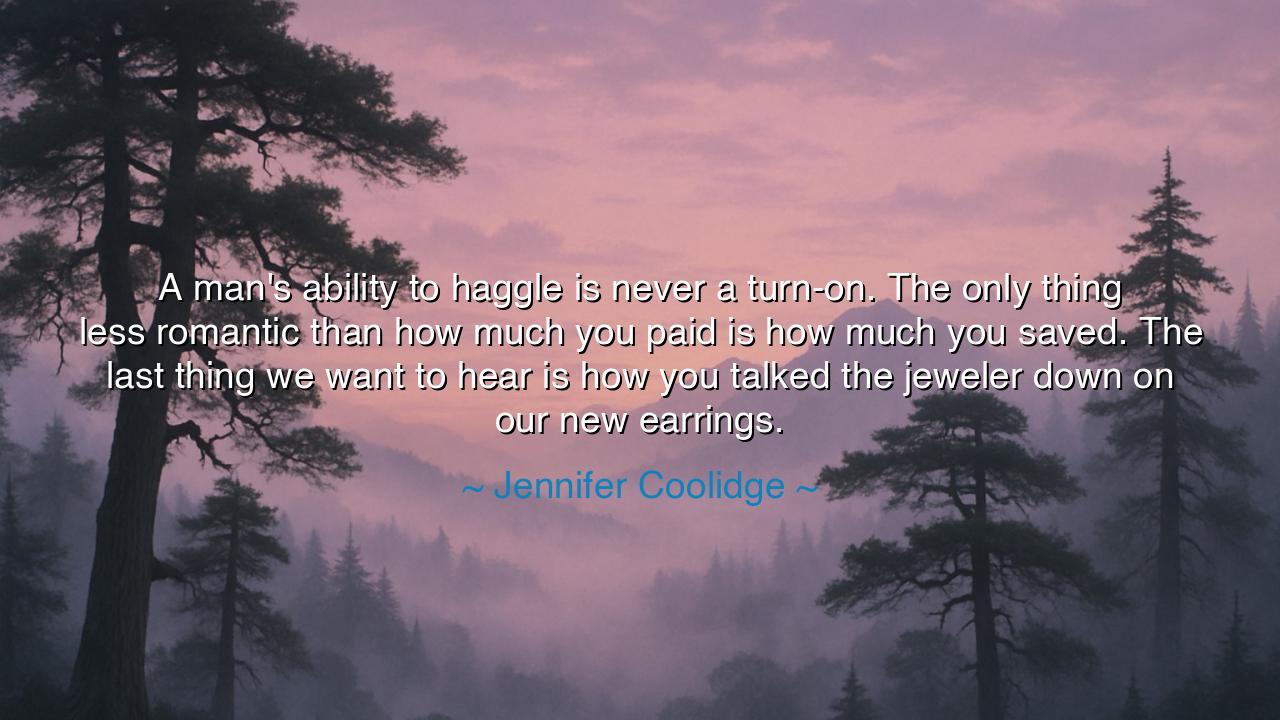
A man's ability to haggle is never a turn-on. The only thing less
A man's ability to haggle is never a turn-on. The only thing less romantic than how much you paid is how much you saved. The last thing we want to hear is how you talked the jeweler down on our new earrings.






In the words of Jennifer Coolidge, “A man’s ability to haggle is never a turn-on. The only thing less romantic than how much you paid is how much you saved. The last thing we want to hear is how you talked the jeweler down on our new earrings.” Though spoken with humor, these words strike a deeper truth: that love and devotion are not measured in coins, nor does the heart delight in bargains. True romance does not spring from thrift, but from the spirit of generosity, of thoughtfulness, of sacrifice freely offered without calculation.
For the ancients knew well that gifts were not about their market value, but about the honor and intention that accompanied them. When a warrior brought home a spoil of battle, or when a poet placed flowers at the feet of his beloved, the worth was not in weight of gold but in the offering of the heart. To speak of haggling and savings is to shatter the illusion of devotion, to remind the beloved not of their worth, but of the bargain struck. The gift then becomes a transaction rather than a testimony of love.
Consider the story of Antony and Cleopatra. When Antony laid treasures before the queen of Egypt, he did not boast of how cleverly he acquired them or how little he paid. He sought only to dazzle her, to declare in splendor the greatness of his passion. It was not the jewels themselves that won her heart, but the message they bore: “You are worth the riches of empires.” To boast of a discount in such a moment would have been folly, a reduction of grandeur into banality. So too does Coolidge remind us that love loses its fragrance when mingled with the dust of calculation.
The jeweler in her quote stands as a symbol. He is not merely the seller of rings and earrings, but the keeper of sacred tokens, for jewelry has long been bound to covenant—wedding bands, heirloom necklaces, and treasures that outlive generations. To reduce such tokens to the realm of barter is to forget their sacredness. The lover’s task is not to recount the cleverness of the bargain, but to bestow the gift with reverence, as though placing a star into the hand of the beloved.
And yet, the teaching is not that money is meaningless, nor that prudence is without value. The wisdom lies in knowing when to speak of savings and when to remain silent. For in the sacred space of romance, the heart does not wish to hear of bargains, but of affection. The beloved longs not to know the price, but to feel the weight of being chosen, cherished, and honored. What is saved in coin may be lost in spirit, unless the gift is given with the fullness of heart.
Thus the lesson is clear: when offering love, do not count the cost aloud. Give as though the gift were beyond measure, and let your beloved feel that they are worth more than all the silver in the world. Speak not of haggling, but of devotion; boast not of savings, but of affection. For in love, the truest currency is intention, and the most valuable treasure is the feeling of being cherished without condition.
So what must you do? When you bring a gift, whether jewel or simple flower, bring it with humility and joy. Do not explain its cost, nor the cleverness of your bargain. Let it be received as though it were priceless, for in the heart of the one who loves, it truly is. And in this way, you honor the wisdom of the ages: that romance is not about the market’s measure, but about the soul’s offering.






AAdministratorAdministrator
Welcome, honored guests. Please leave a comment, we will respond soon